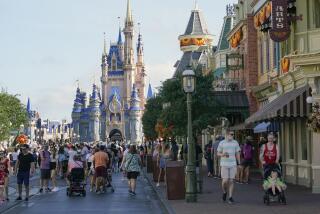Disney is visited by recession
- Share via
Walt Disney Co. reported a 46% drop in net income for its second quarter, blaming disappointing results from its movie studio and a weak global economy, which took a toll on the entertainment giant’s tourism-dependent theme park and advertising-reliant broadcast television businesses.
Disney shares nonetheless jumped 4% in after-hours trading on the news, which beat Wall Street’s more pessimistic forecasts. Investors appeared to have been reassured by hints from Disney management that the economy’s free-fall may be slowing.
“While we’re now seeing some signs that the economic downturn has stabilized, it’s too early to make predictions about the timing and pace of the recovery,” Disney Chief Executive Robert A. Iger said.
For the quarter ended March 28, Disney’s net income fell to $613 million, or 33 cents a share, from $1.13 billion, or 58 cents, in the year-earlier period. Revenue slid 7% to nearly $8.1 billion. The results included a restructuring and impairment charge of 10 cents a share.
Disney’s parks have been feeling the brunt of the recession, mainly because of people’s reluctance to take vacations during tough economic times. Operating income was off 50% to $171 million, from $339 million a year earlier, on revenue that was down 12% to $2.4 billion.
The margins were squeezed by aggressive promotions to keep visitors coming to Disney’s domestic parks, including discounted hotel rates at Walt Disney World in Orlando, Fla. The promotions propped up attendance during the quarter, when admissions at Walt Disney World slipped a modest 1%, and gained 2% at Disneyland in Anaheim. They also helped Disney maintain an occupancy rate of 89% at its hotels in Orlando -- but nonetheless led to a 17% drop in spending per room.
“We made a conscious decision to put in place promotions that would drive attendance. This strategy has had a predictable impact on margins, but it’s also had the intended effect of bringing people to our parks,” Iger said.
Chief Financial Officer Thomas Staggs said the promotions helped Disney’s domestic resorts maintain room reservations that are “nearly on par” with the prior year.
“It’s a horrible choice,” said Laura Martin, a media analyst with Soleil Media Metrics. “Either your hotels are empty but per-room spending isn’t so bad, or fill ‘em up with three days free, but spending gets decimated per room.”
The weaker ad market didn’t affect Disney’s television business as much as some analysts had predicted. Operating income for the media group fell a modest 4% to $1.3 billion, while revenue rose 2% to $3.6 billion, largely because of Disney’s powerhouse cable networks: ESPN, ABC Family Channel and Disney Channel.
But the broadcasting business struggled with continued weakness in local ad sales and lower spending on political advertising, which led to depressed revenue at Disney’s television stations. Ad sales for the ABC network also fell while production costs were up compared with a year ago, primarily because of shows affected by the writers strike. Higher international sales of “Ugly Betty,” “Desperate Housewives” and “Criminal Minds” helped offset program expenditures.
“We’re seeing ad buyers making decisions and placing orders closer to the dates their ads run,” Staggs said. “We’ve seen a similar trend in the booking window at our resorts. So while we believe that the pace of decline is generally stabilized, we believe that ad buyers and consumers remain cautious.”
ABC has been unable to launch a new hit show in recent years, and its ratings have slipped 3% this season. The network’s less-than-stellar performance could spell a rough ride in the coming months, as television executives are about to begin the crucial advance sale of commercial time. ABC will likely have difficulty maintaining its share of dollars if advertisers balk at paying higher rates for a smaller audience.
The network and TV stations’ 38% decline in operating income was partially offset by a 5% gain in operating income at Disney’s cable channels. ESPN managed to rake in higher cable subscriber fees that buffered the effect of reduced advertising revenue from consumer electronics, automotive and finance industries. ABC Family also saw advertising gains and higher cable fees.
Operating income for the consumer products group fell 24% to $97 million, from $127 million a year ago. Revenue increased 9% to $496 million. The company’s acquisition of the Disney Stores boosted sales, but dragged down profits and margins. The soft economy is not only hurting stores but also the royalties that Disney collects from sales of licensed merchandise, off 10%.
Disney’s interactive media group, which includes development for video games and online virtual worlds like Club Penguin, reported an operating loss of $61 million -- on par with losses of $60 million from a year earlier. The results were a reflection of fewer sales of Disney’s video games. Revenue slipped 17% to $129 million.
--
More to Read
Inside the business of entertainment
The Wide Shot brings you news, analysis and insights on everything from streaming wars to production — and what it all means for the future.
You may occasionally receive promotional content from the Los Angeles Times.










